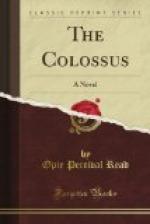“I start for Mexico to-morrow.”
“Yes, but you’ll not be gone long. The trip will be good for you. Let me have a chair,” he said. “Thank you,” he added, when a chair had been placed for him. “I am quite beside myself—I see things in a new light.” He sat down, reached over and took Henry’s hands; he shoved himself back and looked at the young man. “Age is coming on, but I’ll see myself reproduced.”
“But not supplanted,” Henry said.
“No, not until the time comes. But the time must come. Ah, after this life, what then? To be remembered. But what serves this purpose? A perpetuation of our interests. After you, your son—the man dies, but the name lives. No one of any sensibility can look calmly on the extinction of his name.”
He arose with a new ease, and with a vigor that had long been absent from his step, paced up and down the room. “You will not find it a sacrifice, my son; it will become a fascination. It is not the love of money, but the consciousness of force. The lion enjoys his own strength, but the hare is frightened at his own weakness and runs when no danger is near. Small tradesmen may be ignorant, but a large merchant must be wise, for his wisdom has made him large. Trade is the realization of logic, and success is the fruit of philosophy. People wonder at the achievements of a man whom they take to be ignorant; but that man has a secret intelligence somewhere; and if they could discover it they would imitate him. Don’t you permit yourself to feel that any mental force is too high for business. The statesman is but a business man. Behind the great general is the nation’s backbone, and that backbone is a financier. Let me see, what time is it?” He looked at his watch. “Come, we will all go to the theater.”
Witherspoon drove Henry to the railway station the next evening, and during the drive he talked almost ceaselessly. He complimented Henry upon the wise slowness with which he had made up his mind; there was always too much of impulse in a quick decision. He pointed his whip at a house and said: “A lonely old man lives there; he has built up a fortune, but his name will be buried with him.” He spoke of his religious views. There must be a hereafter, but in the future state strength must rule; it was the order of the universe, the will of nature, the decree of eternity. He talked of the books that he had read, and then he turned to business. In a commercial transaction there must be no sentiment; financial credit must be guarded as a sacred honor. Every debt must be paid; every cent due must be extracted. It might cause distress, but distress was an inheritance of life.
To this talk the young man listened vaguely; he said neither yes nor no, and his silence was taken for close attention.
When they arrived at the station, Witherspoon got out of the buggy and with Henry walked up and down the concrete floor along the iron fence. It was here that the stranger had wonderingly gazed at the crowd as he held up young Henry’s chain.




